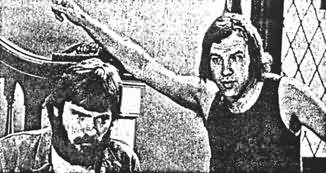THE PSYCHIATRIST BOWS--and with it a
personal statement
by Cecil Smith
TV Times (Los Angeles), 1971
 Television is mostly by committee. One of its
glaring weaknesses is its inability to accommodate the artist
who wants to make a personal statement on film, which is about
the only kind of film worth a damn.
Television is mostly by committee. One of its
glaring weaknesses is its inability to accommodate the artist
who wants to make a personal statement on film, which is about
the only kind of film worth a damn.
Maybe the closest to this that has happened lately is in the six episode mini-series The Psychiatrist, which stars Roy Thinnes (on the cover) and Luther Adler and opens Wednesday night as the fourth short series on NBC's Four-in-One. The statement maker, in this case, is 28-year-old Jerrold Freedman.
Photo Caption: Pete Duel, (left), is directed by Jerrold Freedman in an episode of NBC's Psychiatrist.
Freedman is a large, lanky, puffy lad with eyes much older than his years, who dislikes the term "filmmaker" for its connotations of things artsy-craftsy and nonprofessional, though a film-maker is exactly what he is. At the moment, he's writing a screenplay set in the Chesapeake Bay area of Maryland where he spent his boyhood which is called "The FilmMaker," though it's not in the least autobiographical.
He wrote the script and produced the World Premiere "God Bless the Children" which spawned The Psychiatrist, and it was the first film he had either written or produced. But he avoids credit--he points out he was working with such veterans at making film as executive producer Norman Felton and producer Jack Laird.
As a series, The Psychiatrist was literally Freedman's baby. His influence is in virtually every frame of the six films.
He wrote, directed and produced the opener, "In Death's Other Kingdom," which is a continuation of the case of junky Casey Poe (Pete Duel), which was first explored in "God Bless the Children."
The film defined the central character of Dr. James Whitman (Thinnes) and established the course which the series would follow. Freedman worked with the writers and directors of each succeeding episode to achieve the kind of unity of thought and viewpoint he wanted.
"I like the mini-series," he said the other day. "We could not have done in 24 shows what we did in six. That kind of quality and unity would have been impossible." A quiet man, he paused, smoking rapidly. "I don't know whether it will continue beyond these six. It's the best work Roy Thinnes has ever done. For his sake, I hope there is more."
Not for Freedman's sake? "I don't think so. I poured so much of myself into these six that maybe I should move to something else. My contribution is made and someone else might be better."
As in the Kent State parallel of the recent two-part Senator, Freedman's "In Death's Other Kingdom" made last summer has the immediacy of a story out of the news. Duel as Casey Poe. wearing a bushy beard, is placed by Dr. Whitman in a methadone maintenance program through special permission of his parole board. Even as the show was announced, there was a front page story of convict addicts petitioning the state of California to allow them to continue in a methadone program to control drug addiction. I hope the convicts came out better than Casey.
Freedman got involved in film making as a freshman at the University of Pennsylvania with a job with a small film company that made commercials. Later, as a scholarship student at the Annenberg School of Communications, he worked in educational television in Philadelphia, writing, directing, producing and sweeping out. After a hitch with the Army, he was hired by Universal as a coordinator–"I was lucky: I got the best shows on the lot, Run for Your Life, Chrysler Theater..."
The natural step was to producing. Writing and directing, which Freedman feels are part of the same function, grew out of producing. His direction makes news on the lot, particularly a scene with the parole board for "In Death's Other Kingdom" which has the board members on high benches with brightly sunlit windows behind them and Peter Brocco like a grand inquisitor as their chairman, which is almost Kafka in feeling. Freedman has also directed for other series, notably The Senator.
He thinks of himself primarily as a writer, a poet--that title "In Death's Other Kingdom" is from Eliot's "The Hollow Men." His films literally explode with words, a barrage, a shrapnel burst of words that bridge scene and clash angrily with the visual experience, an oral counterpoint to what is seen.
In pictures and language, the artist makes
his statement. Agree with it or not, it is his own.
Back
to Articles List